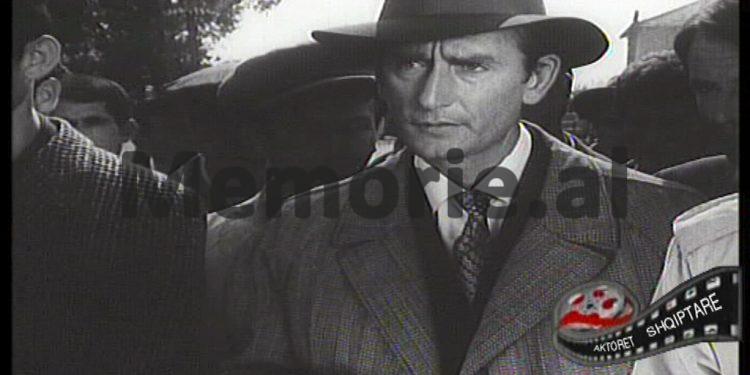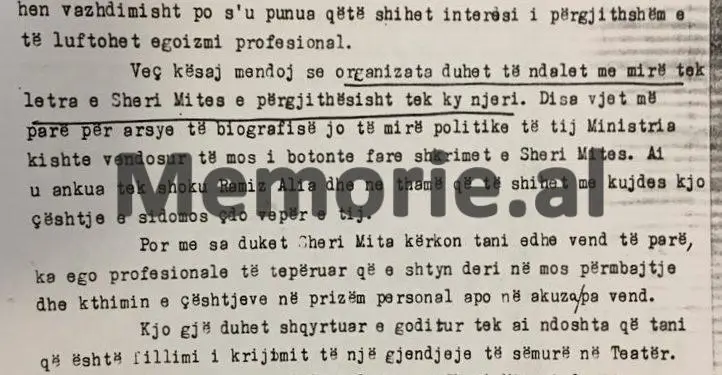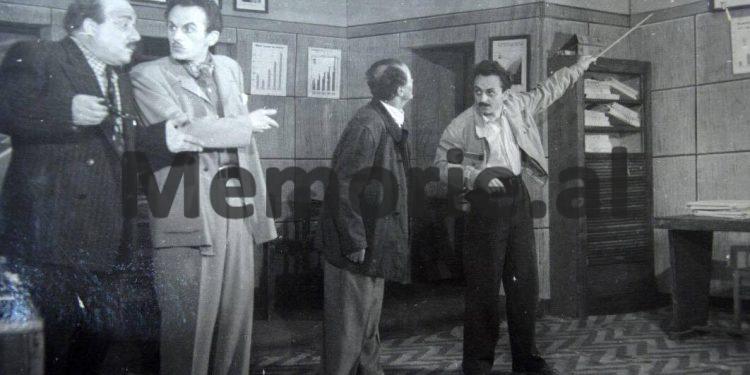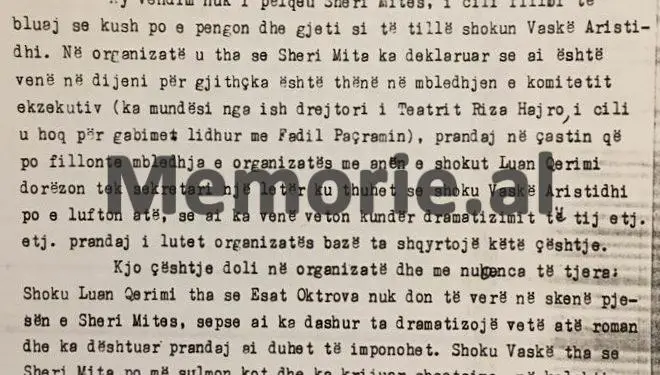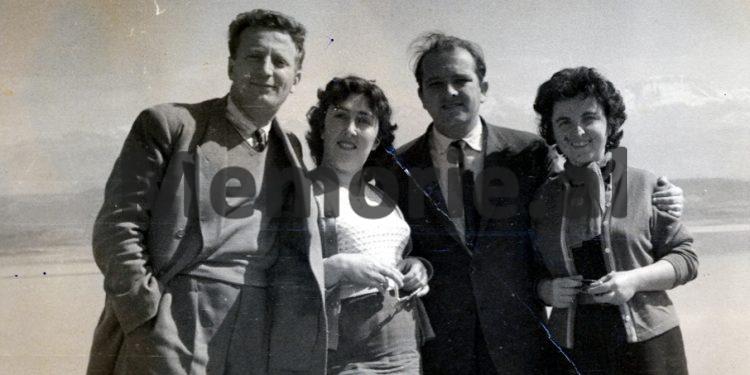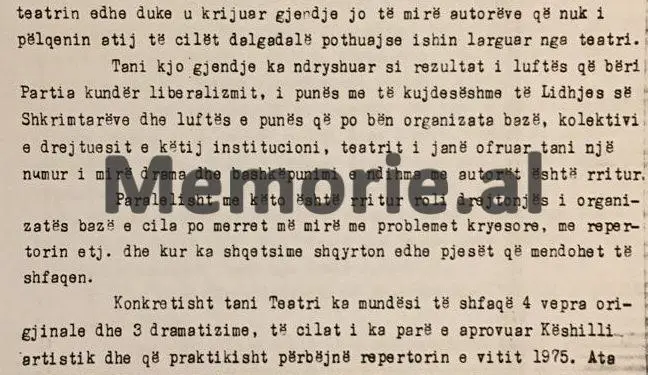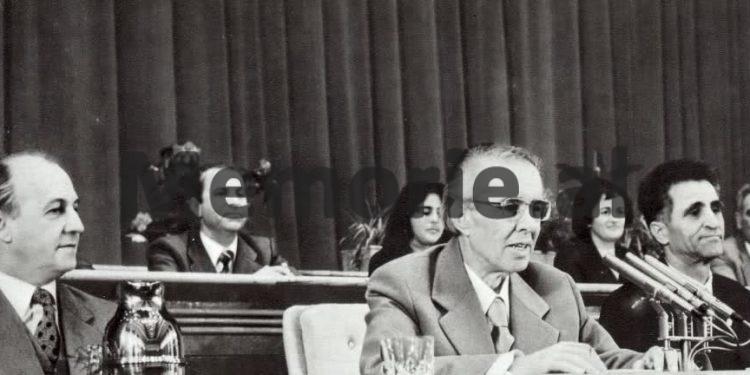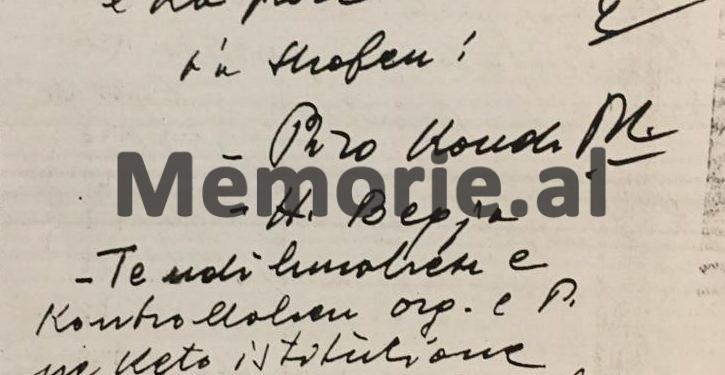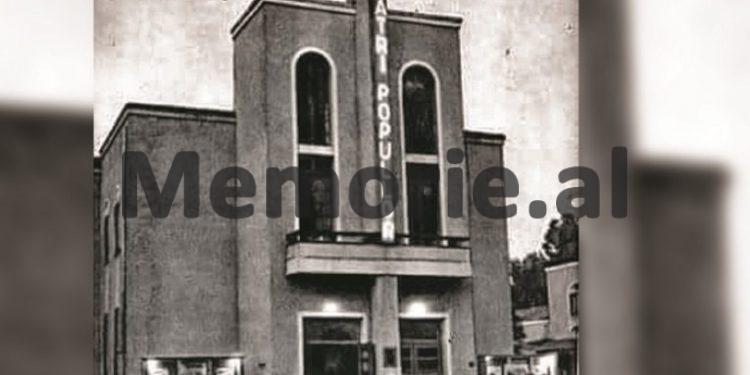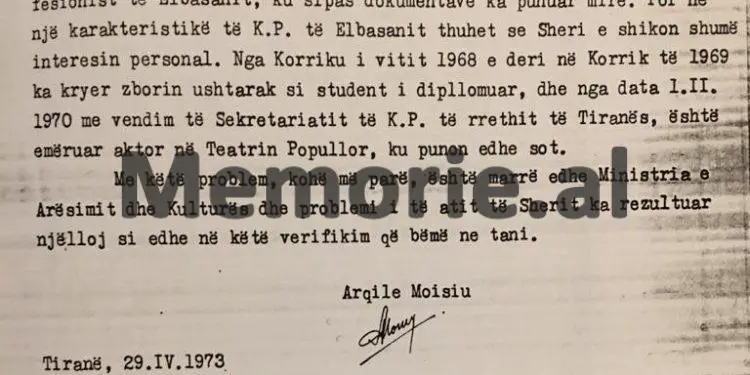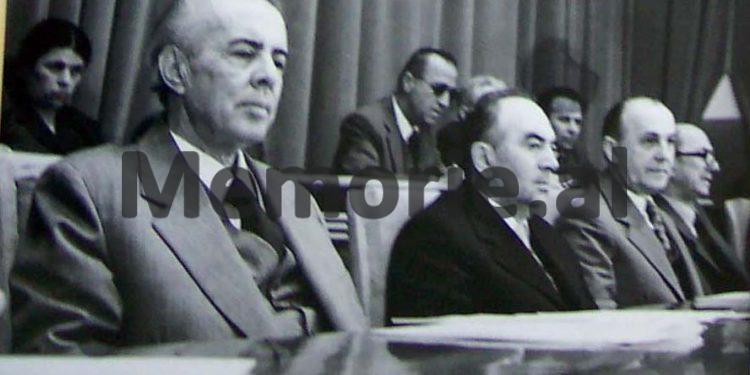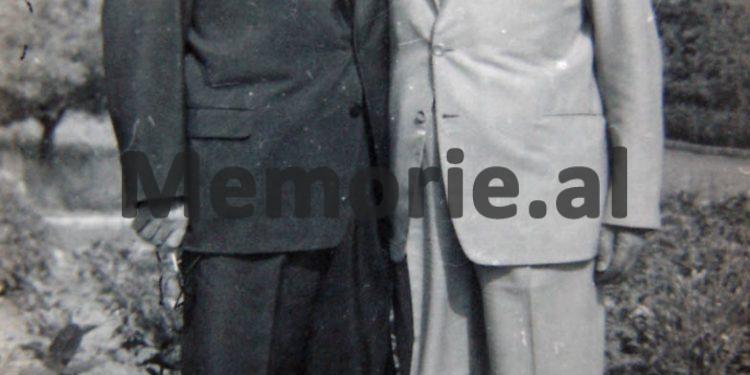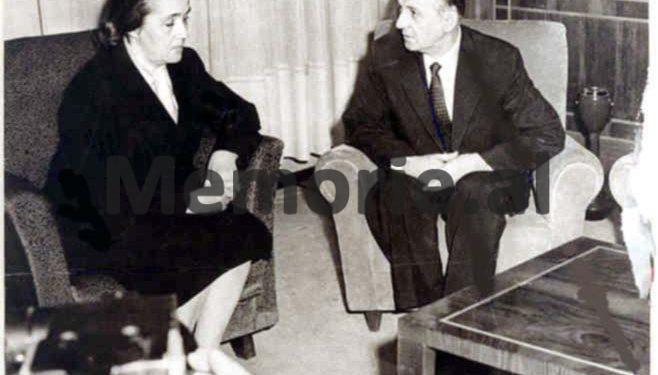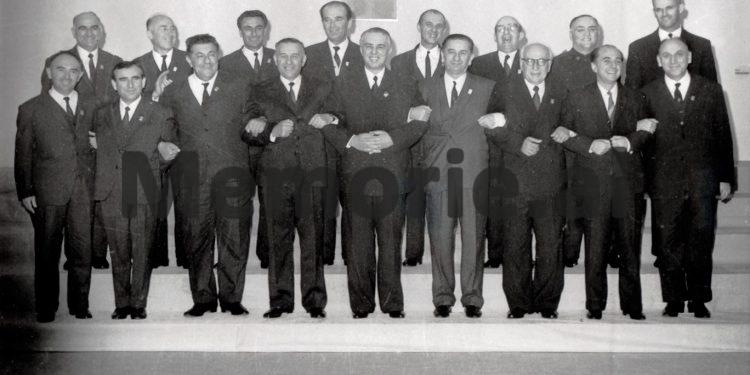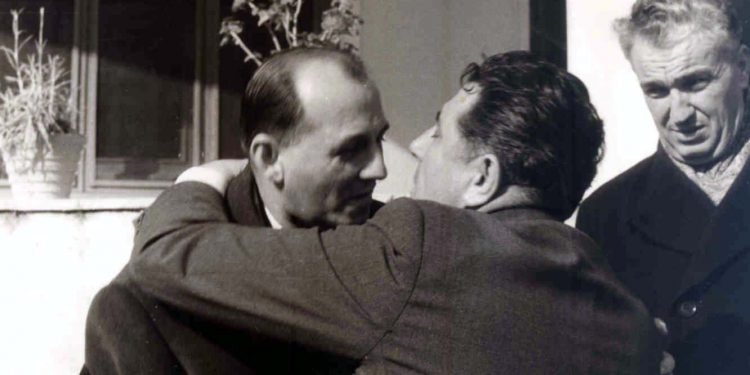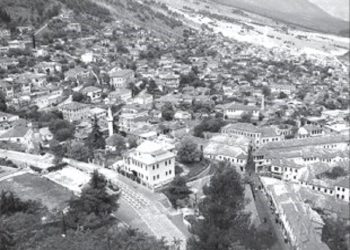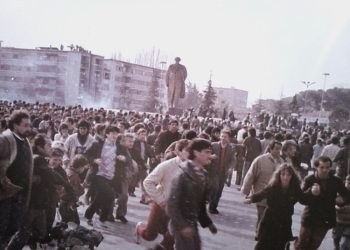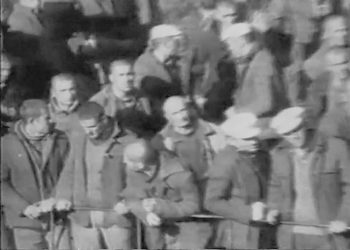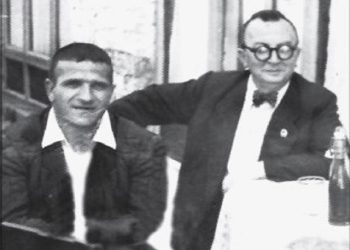Dashnor Kaloçi
Memorie.al publishes some archival documents extracted from the fund of the former Central Committee of the ALP at the Central State Archive belonging to the period 1973-74 and speaks of correspondence of the chief of staff of the secretary of the Central Committee of the ALP, for art, culture and propaganda, Ramiz Alia, (Ilo Kodra) with the other secretary of the Central Committee, Hysni Kapon, regarding a letter of complaint submitted by the actor of the People’s Theater, Sheri Mita, where he tells about conflict and disagreement with the Director, Vaskë Aristidhi, regarding the disapproval of the dramatization of the theatrical play “Unforgettable Years”, which he wanted to stage at the People’s Theater. How did the conflict that lasted for two years intensify, where the three main figures of the high communist leader after Enver Hoxha (Hysni Kapo, Ramiz Alia and Manush Myftiu) were engaged in resolving it, demanding the documents of the Framework Office for the actor Sheri Mita, and to pass on a fine “sieve” biographies of his family and relatives, where it turned out that he had had his father fleeing to the US, his gendarme uncle during the war, and some of his relatives excluded from the party, which caused his drama not to be approved to be staged, as according to them, “it had a spirit of social democracy, which did not exist in Albania”, as well as the “implication” of some actors, playwrights, and directors of the People’s Theater, such as Riza Hajro, Pirro Mani, Esat Oktrova, Pjetër Gjoka, Sulejman Pitarka, Luan Qerimi, Dhimitër Pecani, etc.
The documents we are publishing in this part of the book belong to the period 1973-74 and refer to a long correspondence between the chief of staff of the secretary of the Central Committee of the ALP, Ramiz Alia, (Ilo Kodra) and the other secretary. of the Central Committee, Hysni Kapo, regarding a conflict that had occurred in the People’s Theater, between the actor Sheri Mita, who was also writing the drama, with the director of that theater, Vaskë Aristidhi. As we will see from the documents in question, the dispute between them came after the director of the People’s Theater refused to stage the play “Unforgettable Years” (dramatization) that Sheri Mita had written on the occasion of the 30th anniversary of the Liberation, he rejected it as “a piece that was poorly written and did not make it to the stage.” Which angered the actor and playwright, Sheri Mita, after the director himself had asked him to write that piece and when he finished it, he had not accepted it, but instead had accepted it. the work “Together with the dawn” by the famous writer and playwright Kole Jakova. After that, the actor Sheri Mita made a complaint and sent it to the basic organization of the party of the People’s Theater, where he explained in detail the conflict and the disagreement with the director, Vaskë Aristidhi. All these problems have arisen from a meeting that took place at the People’s Theater on September 26, 1975, where the parts of the repertoire were analyzed and approved for that theatrical season, and for everything that was said there, it was done more after a detailed report-information to the Secretary of the Central Committee of the ALP, Ramiz Alia (covering art, culture, and propaganda), and at the same time that report-information was sent to the Secretary of the Central Committee of the ALP, and the member of Political Bureau, Hysni Kapo who covered the bodies of the “Dictatorship of the Proletariat” (Ministry of Defense, Ministry of Interior, State Security, Prosecution, Investigation, Courts, etc.), who have put their notes in those documents. As we will see in the documents in question, it seems that this dispute between Sheri Mita and the director, Vaskë Aristidhi did not pass easily, as the top leadership (Hysni Kapo and Ramiz Alia), after committing to solving that problem Manush Myftiu, Mantho Bala, Dashnor Mamaqi (who covered the Art of Culture in the Tirana Party Committee, the Ministry of Education and Culture and the Central Committee of the ALP) have also requested the character of the actor Sheri Mita (who was in the file of his personal close to the Framework office), where it turned out that he had his fugitive father in the US and some of his other relatives (uncles and uncles), with biographical problems or excluded from the Party, etc., etc. etc. In addition to these problems, in the analysis made for Sheri Mita, it is said that his dramatization “Unforgettable Years” could not be staged, “because there was a spirit of social democracy that did not exist in Albania”, etc. Also, some actors, playwrights, and directors of the People’s Theater have been “implicated” there, such as Riza Hajro, Pirro Mani, Esat Oktrova, Pjetër Gjoka, Sulejman Pitarka, Dhimitër Pecani, etc. Furthermore, they know the documents in question that, like most of the pages of this book, are published in full and without any changes.
Instructions and messages of Ramiz Alia’s chief of staff
To order Comrade Hamit
They talked with Comrade Mantho Bala, Dashnor Mamaqi and Comrade Xhabir, Secretary of the Party Committee of the Region No. 1.
Dt. 05/19/1973
Cannot be activated in cinematography (Mantho Bala)
It can be said why he keeps in touch with his father (from the collective and someone else)
Later in September, as part of the circulations that can be done, he can go to another theater (with Mantho Bala and Dashnor Mamaqi). On this occasion, it should be clarified why he came from Elbasan to Tirana.
Actor Sheri Mita’s biography according to the Framework Office file
BIOGRAPHICAL DATA FOR THE ACTOR OF THE PEOPLE’S THEATER
SHERI MITA
From the review of the personal file of Sheri Mita in the Party Committee of the Region no. 1 and some opinions exchanged for this purpose with some other friends, results as follows:
He was born on 14. I. 1943 in the village of Fterrë in the district of Saranda. He comes from a family of poor rural social origin.
His father, Shefki Mita, was a teacher from 1939 to 1943. In the characteristic of the High Institute of Arts, it is said that the father of Sheri Mita, was very much connected with the National Liberation Movement, but from the end of the National Liberation Movement, since he stole, he was afraid that they would kill him and went to Tirana, where he secured a scholarship and fled to study in Salzburg, Austria. After graduating, he fled to the United States where he works as a professor, and according to the data we have, he does not carry out activities against our country, and it is not known if he has changed his citizenship. Sher’s mother works as a cook and has been divorced from her husband since 1952. Sherry’s relationship with her father is rare and she takes paper for 1-2 years.
Sher’s uncle, Nail Bezhani, who was a partisan and worked for the company on December 21, is now a KEMP invalid, and has been expelled from the Party for “Lack of sincerity in documents.” The other uncle, Nafiz Bezhani, a lawyer by profession, was also expelled from the Party on the grounds of “loss of confidence in the Party line” because he was a collaborator of the anti-party group that appeared at the Tirana Conference. Sher’s uncle, Arif Mita, was a gendarme in Tirana and was killed in 1943 in Durrës in a gun attempt with a gendarme there. From the mother’s tribe, there are also first cousins, Ismet Elezin, Besim Elezin, Jakup Maton, etc. According to the autobiography of Sheri Mita himself, he has about 16 party members in his family.
Sheri Mita himself graduated in 1961 from the Construction Technical School and until 1963 he worked in the Water Directorate in Durrës and then in the Ministry of Communications as the technical manager of the Durrës-Tirana road.
From 1963 until now he has continued at the Higher Institute of Arts. After graduating from the Institute, he was appointed actor at the Professional Theater of Elbasan, where according to the documents he worked well. But in a characteristic of the Elbasan Party Committee, it is said that Sheri Mita sees a lot of personal interest. From July 1968 to July 1969, he served in the military as a graduate student, and from 1.II.1970 by the decision of the Secretariat of the Party Committee of the Tirana District, he was appointed actor at the People’s Theater. , where he still works today.
The Ministry of Education and Culture has been dealing with this problem for a long time, and the problem of Sher’s father has had the same result as in this verification that we have done now.
M.
Tirana, 29.IV.1973
Complaint letter from actor Sheri Mita sent to the party organization of the People’s Theater
PARTY BASIC ORGANIZATION
PEOPLE’S THEATER
T I R A N E
My play “Unforgettable Years”, which I wrote with the help of the Director of our Theater (personally the director with the intention of staging it by the People’s Theater (the right to put it first), was approved at several meetings of the Council Artistic, but unfortunately moved, though there was a queue.
I am of the opinion that the path of its displacement is not fair, for the following reasons:
Both the pretext dramas, mine and Kol Jakova’s, were evaluated by the Artistic Council separately, in parallel, both were approved in parallel and they were not confronted. The council did not convene to conclude which one should be put in place.
The director used the veto and presented his opinion to the distorted Executive Committee. (Answer is given to me by the Executive Committee: Your play has remarked, while the other is ready)
In the veto used by the director (I have no objection to him deciding for himself but in the right way), he did not take into account the line of action, he used it as much as he did not get the opinion of the collective (for other dramas he took this opinion), and she most importantly, did not get the opinion of the organization.
His relationship with me as an author has not been good. When I presented the play to him, he refused to talk (he commissioned the play himself), but instead used a very offensive tactic, saying, “Go away because you didn’t do anything.” I calmly asked, without breaking the blood, a conversation about the baby (drama), but again the same disregardful attitude: “Your drama does not.” I was forced to say, “Time will tell if it’s good or bad.” I left broken spiritually and persistently continued working with the drama. Time showed that my work was good. The council approved it. My opinion is that Comrade Vaskë Aristidhi, in order not to lose his presidency, said: “Your drama does not work”, and he did not hesitate to spread this opinion to different people, including Shefqet Musaraj, among others. foot not to be put. For these reservations, I think the issue of my drama needs to be addressed in the party organization.
Revolutionary greetings
Sheri Mita
Tirana, on 25/9/1974
……………………………………………………………………………………………………………………………………
Note by Qemal Myrseli, the instructor at the Central Committee
This information represents an unhealthy state of the People’s Theater party organization. Professional selfishness, divisions, and quarrels continue there. I think that the Committee of the Tirana Party will analyze it with a team and take measures to improve the situation by removing any actor or director if necessary.
09/30/1974
Note by Hysni Kapos
If Ramiz has seen it, let me see Pirro Kondi and Hamit Beqja.
Help and control the Party organization in these central institutions to strengthen their role and ideological work with employees, because there are people with cabbage in their heads.
Hysni Kapo
1.II.1974
Report-information of Ilo Kodra, secretary of Ramiz Alia, regarding the problem of Sheri Mita
I N F O R M A T I O N
On September 26, 1974, the basic organization of the Dramatic Theater met to approve the repertoire for 1975.
In the material that was presented and the discussions, it turned out that the Theater is going through the bad situation that was created by the harmful activity of Fadil Paçrami and the performances of liberalism in this institution. It was said, among other things, that Fadil had damaged the theater by creating unfavorable conditions for authors who did not like those who had almost left the theater.
Now this situation has changed as a result of the war waged by the party against liberalism, the more careful work of the Writers’ League and the labor war being waged by the grassroots organization, the collective and the leader of this institution, the theater has now been offered a good number drama and collaboration and help with authors has increased.
In parallel with these, the leading role of the basic organization has increased, which is better dealing with the main problems, with the repertoire, etc., and when there are concerns, it also examines the parts that are supposed to appear.
Specifically, the Theater now has the opportunity to present 4 original works and 3 dramatizations, which have been approved by the Artistic Council and which practically constitute the repertoire of 1975. They have 5 other plays that are considered valid to be reviewed by the Artistic Council.
This fact was considered very positive by the organization and the discussants pointed out the good work of the director, comrade Vaskë Aristidhi, and the Artistic Council in this regard.
However, the organization was reprimanded for better work in the future. Thus e.g. was criticized for the fact that many of the dramas thought to be included in the 1975 repertoire that the organization would approve of are not known to the authors of the organization. It was criticized when the Communists were instructed to read two plays that they would be asked for their opinion, but in the end this opinion was not sought.
Remarks were also made to the director Vaskë Aristidhi to be more careful with the authors, especially when it comes to evaluating their works and more restrained regarding the requirements of the collective.
The director’s case was strongly raised in the organization. It was said that by order of the Ministry, the only director of the theater, Pirro Mani, passed the Opera House as an aid plus to stage the opera “Commissar”, and as a new cadre, he was given to this work, Dhimitër Pecani, who has failed to put 2 pieces on stage and is generally considered weak.
The organization approved as a repertoire for now and in 1975 the dramas: “Smoke that erodes”, author Ziso Cikuli, “Together with the dawn”, author Kole Jakova, “Dead River”, dramatized by Kudret Velça, “Epopee of the National Front”, dramatized (Comedy), “Unforgettable Years”, a dramatization of the novel “Before Dawn” by Sheri Mita, “Dawning the year 1945” by Teodor Laço, (published), “Two rifle sins”, a drama by Hamza Minarolli.
5 more dramas will also be considered by the Artistic Council.]
The approval done is in preliminary form after the organization is reported and when there is a request it sees concretely every drama when it comes time to put it concretely on stage.
My opinion is that the meeting went well, the organization is preoccupied with the progress of the work in the institution and is fighting to increase its leading role.
However, there were performances in the organization that show that in that organization, and even more so in the collective one, there is a predisposition to be created even for small things – sick conditions.
Such a thing happened at this meeting as well.
The actor of this theater, Sheri Mita, who also writes drama, has dramatized at the request of his friend Vaskë Aristidhi, the novel “Before the dawn”. When this dramatization was examined, Comrade Vaskë said that there were some ideological remarks, but that they are correctable, so we can work with it. (The main remark was that the drama talked about the existence of a social democracy here in our country, which has never been emphasized).
On this basis, the actor Pjetër Gjoka thought of taking on the role of director and preparing this work to be performed by the Fier Theater.
It was at this time that the theater was taken over by director Pirro Mani. The Art Council decided to fill this gap with its other forces, so it charged actor Sulejman Pitarka, who started working with a part that they thought could put him on stage.
It didn’t take long for the actor Pjetër Gjoka to prepare the drama of Sheri Mita, not for Fier, but for the People’s Theater, because he has a serious family condition (a boy is seriously ill).
This request was approved and work began.
Comrade Vaskë Aristidhi was later summoned by Comrade Manush Myftiu to report on what the Theater was doing on the occasion of the 30th anniversary of the liberation.
Comrade Vaskë said that their Council has reviewed the two plays “Together with the dawn” by Kole Jakovë and “Unforgettable Years”, dramatization by Sheri Mita, but for the latter, there are a couple of ideological remarks and above all the issue of the director.
Comrade Manush said that he was concerned about the issue of social democracy in that drama and, among other things, ordered that the Theater not stage any work if no director was given. This message was also communicated to Comrade Dashnor Mamaqi.
Comrade Dashnor in agreement with the Ministry made available to the Theater as an external director, Comrade Esat Oktrova.
Comrade Esat stated that he was to stage the play of Kol Jakova and not that of Sheri Mita. At this time, the opinion emerged that it was not good to stage the drama of Sheri Mita, because it is a dramatization and not an original work, so it shows creative poverty, which is not good with the case of the 30th anniversary.
On the basis of these justifications, in a meeting in the Executive Committee (the secretary is approved by the Executive Committees), where Comrade Dashnor was also present, it was decided to prepare for the 30th anniversary of the drama of Kole Jakova and not of Sheri Mita.
Sheri Mita did not like this decision, and she started to grind who was hindering her and found her friend Vaskë Aristidhi. The organization said that Sheri Mita stated that he was aware of everything that was said at the meeting of the Executive Committee (possibly by the former Director of the Theater, Riza Hajro, who was removed for mistakes with Fadil Paçrami), so at the moment that the meeting of the organization was starting, through comrade Luan Qerimi handed a letter to the secretary stating that: comrade Vaskë Aristidhi is fighting him, that he has vetoed his dramatization, etc., etc., therefore he begs the organization basis to consider this issue.
This issue came up in the organization and with other nuances. Comrade Luan Qerimi said: Esat Oktrova does not want to stage the part of Sheri Mita, because he wanted to dramatize that novel himself and he failed, so he must be imposed. Comrade Vaskë said that: Sheri Mita is attacking me in vain and has created concerns in the collective, etc., and in the meeting he was electrified.
Finally, the explanation I mentioned above was given and the organization was convinced that the drama of Kole Jakova should be staged, and not that of Sheri Mita.
Immediately after that, the issue was raised in the organization: how the collective will be clarified and all friends were asked to maintain the same attitude, etc.
This gave me the impression that an element outside the organization puts a lot of pressure on the communists to confuse them and encourage and create bad situations in the organization.
Thus e.g. former preoccupation, how would Sheri Mita and Pjetër Gjoka be explained, whom he would kill a lot, especially now that he has a very sick son, if you tell him that he could not be the director of a part for the 50th anniversary, etc., and after Sherri they are 20 others.
This is not a good situation and they will be constantly confused if they do not work to see the general interest and fight professional selfishness.
In addition, I think that the organization should focus better on the letter of Sheri Mita, and on this man in general. A few years ago, due to his poor political biography, the Ministry decided not to publish Sheri Mita’s writings at all. He complained to Comrade Ramiz Alia and we said that this issue should be carefully considered, especially his every deed.
But apparently Sheri Mita is now looking for the first place, too, has an excessive professional ego that pushes him to no content and turning issues into professional prism or accusations without a place.
This should be considered and addressed to him perhaps now that it is the beginning of the creation of a sick state in the Theater.
Attached is the letter that Sheri Mita addresses to the grassroots organization.
Ilo Kodra
Tirana, September 28, 1974
(This article is taken from the book, “Writers and artists under the communist dictatorship”, by journalist Dashnor Kaloçi, which is expected to be published soon)
Memorie.al




